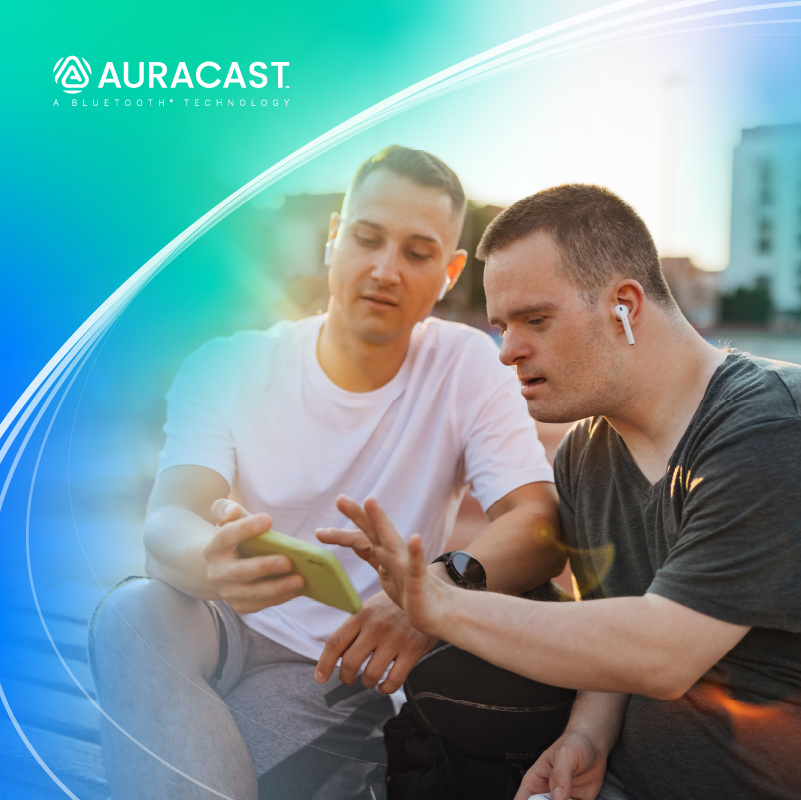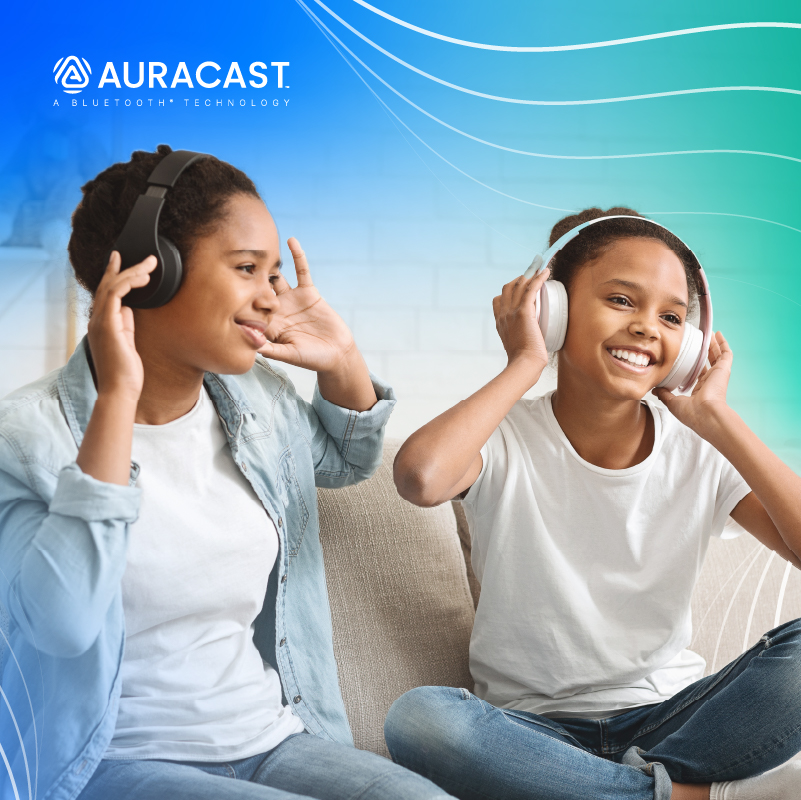A new FCC requirement will pave the way for inclusive audio experiences for all補聴器との連携を義務付ける新FCC規則、すべての人のためのオーディオ体験を実現へ
|
Last month, the Federal Communications Commission (FCC) announced new rules establishing that 100 percent of all mobile handsets sold in the US — such as smartphones — must be compatible with hearing aids and cochlear implants. Thanks to this change, more than 48 million Americans with hearing loss will soon be able to take advantage of the same mobile phone models and connectivity available to all consumers, expanding their choice in handset technologies, features, and pricing.
How we got here

The 2022 release of Bluetooth® LE Audio was a key enabler of this important FCC ruling. Until then, support for Bluetooth technology in hearing aids had only been based on proprietary implementations. As a result, relatively few hearing aids included Bluetooth technology, and compatibility has been limited. Bluetooth LE Audio standardized support for Bluetooth technology within hearing aids and defined the requirements for interoperability between hearing aids and complementary products, such as smartphones. The Bluetooth Special Interest Group (SIG) Hearing Aid Working Group — which includes representatives from Google, Intel, Sonova, Starkey, GN Hearing, and others — was instrumental in bringing this new approach to standardization to the hearing aid market.
The release of Bluetooth LE Audio, therefore, introduced the potential to enable true global interoperability and allow people with hearing loss to realize the same Bluetooth audio benefits enjoyed by users of standard Bluetooth headphones and earbuds – seamless wireless calling, listening, and media streaming. The FCC ruling now helps bring that potential to life for hearing instrument users in the US. The new rules establish Bluetooth® technology requirements that better support a wide range of consumers by ensuring universal connectivity between mobile handsets and hearing instruments, including over-the-counter hearing aids and cochlear implants. This change will encourage manufacturers to move away from proprietary solutions in favor of Bluetooth standards.
“For the first time, Bluetooth® technology has been mandated in smartphones to support those with hearing loss,” said Neville Meijers, Bluetooth SIG CEO. “This marks a significant milestone for hearing aid compatibility across all smartphone brands sold in the US, paving the way for greater accessibility and seamless connectivity for millions of people with hearing loss.”
How a mandate for connectivity can benefit everyone
More than ten years ago, the Federal Motor Carrier Safety Administration (FMCSA) commissioned research that showed that the odds of being involved in a safety-critical event (e.g., crash, near-crash, unintentional lane deviation) were six times greater for drivers who dial a mobile phone while driving than those who do not. The FMCSA, therefore, mandated that hands-free calling be used instead of hand-held mobile devices when operating any commercial motor vehicle.
Additionally, most states in the US have implemented their own hands-free laws for drivers of personal vehicles as well. These regulations not only help keep us all safe while on the road, but they have also encouraged car manufacturers to install a wider range of Bluetooth connectivity options in new vehicles. This evolved beyond hands-free calling and audio streaming to a range of additional value-added use cases, including Bluetooth enabled sensors strategically placed throughout a vehicle to help monitor temperature, tire pressure, open doors, and more.
Similarly, requiring Bluetooth connectivity in all handsets will benefit millions of users. Not only will this create greater accessibility for those with hearing loss, but it will also open a range of new audio opportunities for all.
New possibilities beyond regulation
While this new FCC mandate will positively impact those with hearing loss, it also heralds a breadth of opportunities for creating greater audio accessibility for everyone.

Bluetooth® LE Audio not only adds support for hearing instruments, but it also introduces Auracast™ broadcast audio – a new Bluetooth capability that will let you share your audio with friends and family, unmute silent TVs in public places, and hear your best wherever you go.
- Sharing Your Audio: With Auracast™ broadcast audio, you will be able to invite friends and family around you to share in your personal Bluetooth audio experience. They will be able to search for your broadcast (much in the same way we search for available Wi-Fi networks now), enter the password provided by your smartphone, and join in.
- Unmuting Silent TVs: Many TVs in public spaces are often silent; you can watch, but you cannot hear the audio that accompanies what you see. Thanks to Auracast™ broadcast audio, you will be able to hear audio from silent TVs like those in airports, gymnasiums, waiting rooms, sports bars, transit centers, and other venues.
- Hearing Your Best: When visiting venues like conference centers, theaters, cinemas, lecture halls, places of worship, or airport terminals, Auracast™ broadcast audio will let you hear your best in these noisy public spaces. Locations like these will add Auracast™ broadcast audio to their existing public address systems so visitors can hear high-quality audio using their listening devices.
The future of hearing accessibility with Bluetooth technology
This recent FCC mandate for Bluetooth connectivity in all US smartphones represents a significant step forward for accessibility. By ensuring that every mobile phone sold in the US can connect seamlessly with hearing instruments, millions of Americans with hearing loss can access the same range of audio experiences and benefits enjoyed by everyone else.
The mandate not only benefits those with hearing loss, but it also paves the way for a future where immersive, shared audio experiences are available to everyone, including those enabled by Auracast™ broadcast audio. From inviting friends to share in your personal audio experience to unmuting TVs in public spaces to enhancing audio accessibility in noisy venues, Auracast™ broadcast audio will transform how we share and experience audio in everyday life.
Learn more about the FCC ruling and explore the possibilities Auracast™ broadcast audio will enable.
2024年10月、米国連邦通信委員会(FCC)は、米国内で販売されるスマートフォンなどすべての携帯電話端末について、補聴器および人工内耳との互換性確保を義務付ける新規則を発表しました。これにより、米国内の4800万人を超える聴覚障害者が、他の消費者と同様に、幅広い携帯電話端末や接続機能を活用できるようになり、最新技術や機能、さまざまな価格帯の製品から自由に選択できる環境が整います。
技術革新の歩み

FCCによる今回の重要な規則制定の基盤となったのが、2022年のBluetooth® LE Audio規格の公開でした。それまでの補聴器におけるBluetooth対応は、各メーカー独自仕様に依存していたため、Bluetooth対応補聴器の普及は限定的で、相互換性にも制約がありました。Bluetooth LE Audioは、補聴器におけるBluetooth技術の実装を標準化し、スマートフォンなどの周辺機器との相互運用性に関する要件を明確に定義しました。この標準化の実現において中心的な役割を果たしたのが、Bluetooth SIG(Special Interest Group)の補聴器ワーキンググループです。Google、Intel、Sonova、Starkey、GN Hearingなど、業界を代表する企業の専門家が参画し、補聴器市場における新たな標準化アプローチを確立しました。
Bluetooth LE Audioの登場により、グローバルな相互運用性の実現が可能となり、聴覚障害のある方々も、通常のBluetoothヘッドホンやイヤホンユーザーと同様に、ワイヤレス発信・通話・メディア再生などの利便性を楽しめる環境が整いました。今回のFCCの決定は、米国においてこの可能性を現実のものとします。幅広い消費者に対応できるように、すべての携帯電話がOTC補聴器や人工内耳を含めた補聴のための機器と接続するためのBluetooth®技術要件を定めています。これにより、メーカー各社の独自規格からBluetooth標準規格への移行を促進します。
Bluetooth SIG のネヴィル・マイヤーズCEOは、この意義を次のように評価しています。「聴覚障害者支援を目的としたスマートフォンへのBluetooth®技術対応の義務付けは、画期的な一歩です。米国市場のすべてのスマートフォンブランドにおける補聴器との互換性確保により、何百万人もの聴覚障害のある方々に、より優れたアクセシビリティとシームレスな接続性がもたらされます」
コネクティビティ規制がもたらす社会的価値
10年以上前、米国連邦自動車運輸安全局(FMCSA)が実施した調査で、運転中に携帯電話を操作する運転手は、そうでない運転者と比較して、事故や衝突寸前の状況、意図しない車線逸脱などの重大な事象に遭遇する確率が、6倍高いことが明らかになりました。これを受けてFMCSAは、すべての商用車両の運転において、手持ちの携帯電話の使用を禁止し、ハンズフリー通話の利用を義務づけました。
さらに、米国のほとんどの州が自家用車についても同様のハンズフリー法を制定しています。こうした法令は、道路交通の安全性向上に寄与しただけでなく、自動車メーカーによる幅広いBluetooth接続機能の搭載を促進する契機となりました。その結果、ハンズフリー通話やオーディオストリーミングにとどまらず、車内随所に意図的に配置されたBluetoothセンサーを用いた温度管理、タイヤ空気圧モニタリング、ドア開閉状態の検知など、多様な付加価値サービスへと発展を遂げています。
今回のすべての携帯電話へのBluetooth接続機能の義務付けも、同様に幅広いユーザーに恩恵をもたらす事が期待されます。聴覚障害者のアクセシビリティ向上だけでなく、すべての人に新たなオーディオ体験の可能性をもたらすことになります。
法令を超えた新たな可能性
新しいFCC規則は聴覚障害者への支援に直接的な効果をもたらすとともに、あらゆる人の音声アクセシビリティ向上につながる多様な可能性も生み出します。

Bluetooth® LE Audioは、補聴器対応の追加に加え、Auracast™ ブロードキャスト オーディオも導入しました。この新しいBluetooth機能により、友人や家族とのオーディオ体験の共有、公共空間での無音設定されたテレビの音声受信、さまざまな環境での最適な音声体験が可能となります。
- オーディオ共有:Auracast™ ブロードキャスト オーディオを使用することで、自分がBluetoothで聴いているオーディオを、近くにいる友人や家族と共有して楽しめるようになります。Wi-Fiネットワークの検索に似た直感的な操作で、ブロードキャストを探し、スマートフォンから提供されるパスワードを入力するだけで、同じ音声を共有して楽しめます。
- 無音テレビのミュート解除:空港、フィットネスジム、医療機関の待合室、スポーツバー、交通機関など、多くの公共施設では、テレビの音声が消音に設定されています。Auracast™ ブロードキャスト オーディオの導入により、これらの施設で放映されている映像の音声を個人の機器で直接受信することが可能になります。
- 最高の音で聴く:Auracast™ ブロードキャスト オーディオがあれば、会議場、劇場、映画館、講堂、礼拝施設、空港ターミナルなどの騒がしい公共の場でも、音声を自分にとって最高の音で聴くことができます。Auracast™ ブロードキャスト オーディオを既存の音響設備に統合することで、来場者が自分のオーディオ機器や補聴器を使い高音質の音声を受信できるようになります。
Bluetooth技術による音声アクセシビリティの未来
米国のすべてのスマートフォンにBluetoothによる接続性を義務付ける今回のFCC規則は、アクセシビリティ向上における大きな転換点となります。米国内で販売されるすべての携帯電話端末と補聴器とのシームレスな接続が保証されることで、何百万人もの聴覚障害者が、ほかのすべての人々と同様のオーディオ体験と利便性を享受できるようになります。
この規則制定は、聴覚障害者だけでなく、Auracast™ ブロードキャスト オーディオが実現する没入型の共有オーディオ体験など、すべての人々に新たな可能性をもたらします。個人的な音楽体験の共有から、公共空間でのテレビの視聴、騒がしい環境での最適な音声受信まで、Auracast™ ブロードキャスト オーディオは私たちの日常生活におけるオーディオ体験を根本的に変革する可能性を秘めています。
FCC規則の詳細およびAuracast™ ブロードキャスト オーディオがもたらす新たな可能性についてはこちらをご覧ください。